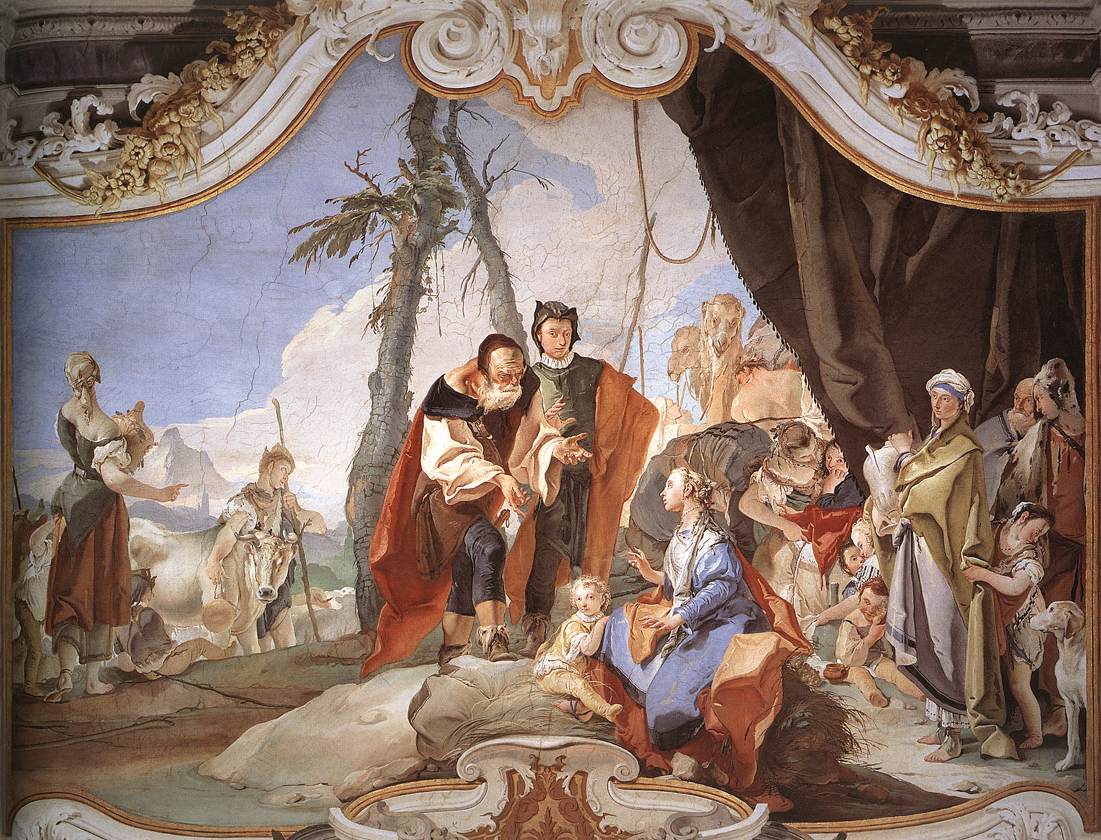So, I'm currently on my period and this thought occurred to me: the title of my blog is the red tent, where menstruating women hung out, yet I've never wrote about menstruation in terms of society and religion. Gender in the realm of religion is one of my favorite academic topics; what kind of scholar would I be if I didn't bring up menstruation? One of my very favorite passages in the Old Testament involves Rachel's escapades in the red tent: in the spirit of seeking revenge on her father, Laban, Rachel steals his household idols. When he comes looking for them, she places them under a sitting pillow in the red tent. Laban enters the red tent and demands to know where his idols are and Rachel replies, "It is my woman's time," or some such. Laban understands instantly and leaves. How clever Rachel is! (Some might say that she is being a tricky, deceptive woman, but no such judgmental statements are actually made like that in the passage. One more reason the J sections of the OT were penned by a woman.)
 |
| Rachel Hiding the Idols from Her Father Laban by Giambattista Tiepolo |
While we're being upfront, I should tell you that I have a gynecological disorder called dysmenorrhea, or, more simply, menstrual pain. Symptoms include extreme lower abdominal, back, and leg pain, excessive bleeding, nausea, fatigue, dizziness and disorientation, migraines, fainting, difficult bowel movements, and hypersensitivity to light, smell, sound, and touch. It's incredibly unpleasant to say the least. Thus far in life, the only relief I've gotten from symptoms is from NSAIDS, heating pads, PMS Tea, and hormonal birth control. In fact, since I started taking birth control 7 years ago - when I was 15 - the symptoms have been limited to mild cramping and fatigue, crazy mood swings and hunger pangs, the occasional migraine, and on and off sexual cravings. I imagine that's what it's like for most women, though. It's fantastic!
Now, how does this all relate? In addition to my love of the formative history of Judaism, I am also quite fond of Medieval Christianity and the lives of female contemplatives in particular. I imagine that, if I were alive during the Middle Ages, my symptoms might have been interpreted quite differently than people see them today. More specifically, such symptoms might denote me as some sort of mystic, a witch, or perhaps the victim of a witch. Indeed, if one were to read accounts of any of these figures today, one could attribute mystical or magical abilities to any sort of common malady. For example, if a female anchor were to recount an ecstatic experience with Jesus, one might conclude that she is actually afflicted with epilepsy and is merely having a seizure. Or, if I were observed by to typical Medieval folk while I was tossing in turning in bed, moaning in pain, vomiting everywhere, and then lose consciousness, they might think a) I was filled with Christ's presence, b) I was possessed by Satan, or c) a witch had cast a spell over me/I was a witch. Some might interpret the dreams and hallucinations I had while passed out at visions from God. I might, like Julian of Norwich, have the opportunity to record my experiences and interpret them as elaborate philosophy on Christ's femininity - I'll discuss Julian's writings later.
 |
| The original cat lady |
There's no denying that menstruation was and is seen by many as some sort of disgusting, unnatural function of the woman's body. Who hasn't heard the very clever phrase, "Women are the only animals that can bleed for 7 days and not die. They must be evil," or some such poppycock. Historically speaking, when men bled, it was because they were doing something masculine - like receiving a war wound. A bleeding man was an honorable one, he shed blood for God or his king or country.
 |
| For example... |
When women bled, however, there seemed to be no rhyme or reason or uniqueness, for every woman bleeds. Furthermore, to add to the 'grossness' of it all, menstrual blood exits via the vagina, a vile, swamp-like place. The vagina was the indicator of the female sex and, after all, females were (are?) considered the cause of evil. Eve caused the Fall of Man. Sheba tempted David. Delilah cut Samson's hair. Helen caused the Trojan War. I could go on, but the point is that women were dirty creatures and the vagina was the apex of filth. It was for procreation only.
Of course, this is somewhat hyperbolic and not the sole reason for all the misogyny in the world, but, in my opinion, this mindset helps account for some of it. There are plenty of people today who thing vaginas are disgusting for various reasons - because they're wet, they emit (completely natural and useful) discharge, they release menstrual fluid, they're flexible, they're hairy on the outside, it's tunnel-like and you can't see where it goes, etc. For centuries, nobody knew for sure how reproduction worked, they just knew if menses didn't occur after a sexual encounter, the woman was pregnant. Some proto-scientists believed woman was just merely a vessel and man's seed carried all the ingredients to implant a baby in the womb. Yes, woman's reproductivity was a mystery to many. But why did mystery have to mean evil?
 |
| Have a happy period. |
Anyway, I think that's it for now. In my next post, I'll discuss the idea of a feminine Christ figure as presented by Julian of Norwich.
No comments:
Post a Comment